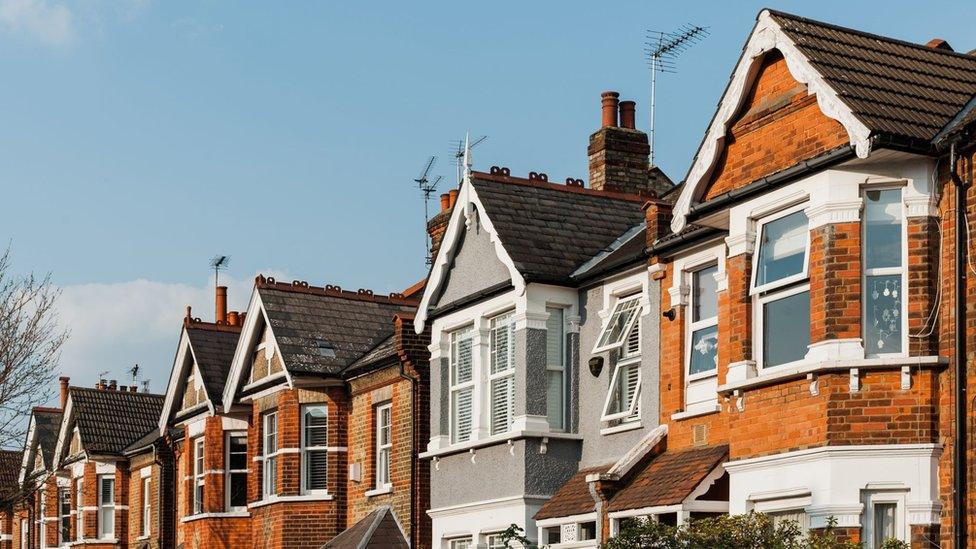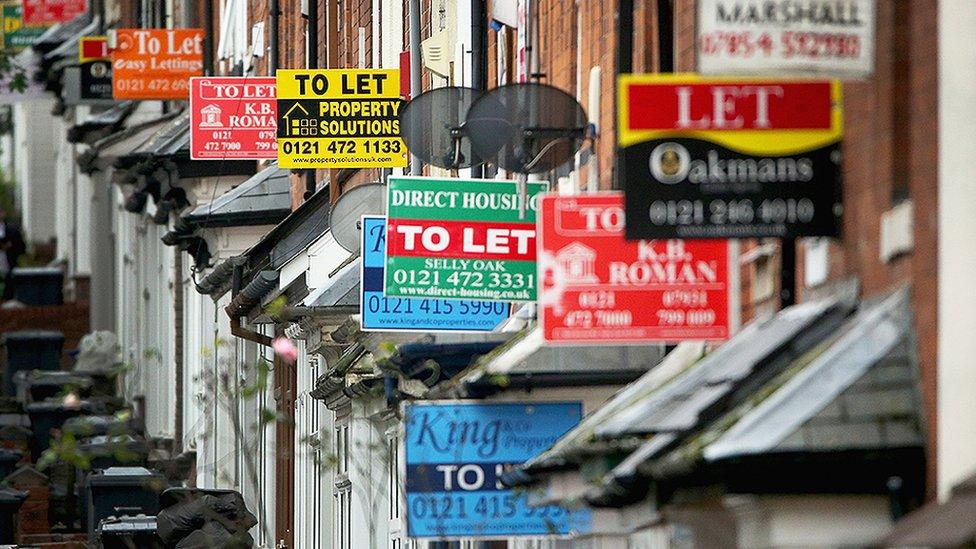'I put off starting a family because of a £300 rent rise'
- Published

Aimee and her husband had their rent hiked from £1,200 a month to £1,500
For 32-year-old Aimee, the prospect of starting a family remains out of reach.
She and her husband were priced out of their two-bedroom house in Surrey when their landlord hiked their rent by £300 a month, forcing them to move into a smaller one-bedroom property.
"I'm at the age where I want to have children, but because we had to downsize, we are just unable to."
She says she and her husband won't now try to start a family until they are able to move again.
"I now pretty much live out of one room. I pretty much work, sleep and everything from my bedroom."
'Perpetual renter'
UK rents rose by 9% over the 12 months leading up to February, the highest annual increase since the Office for National Statistics began keeping records in 2015.
Housing has been a constant stress for Aimee, as she recalls her previous experience renting, involving black mould, damp and water dripping down the walls.
"There was a period when I had a lot of difficulty with anxiety and stress. I caught shingles nearly a year ago due to stress issues I had either with money or housing."
She is considering relocating to the North of England as the only way to get on the property ladder, but that would mean moving away from her extended family and support network.
She fears that she will be a "perpetual renter".
Aimee is not alone. A recent survey conducted by Shelter and YouGov suggested that 54% of women feel that being a renter has held them back in some way. That is compared to 48% of men.

There can be massive competition for rental properties
Rhiannon, 27, says renting has left her feeling reduced to a "pay cheque".
"If you're not willing to pay more, you're gone," she explains, describing a dramatic ultimatum she faced while renting in London - accept a 65% rent increase or face a no-fault eviction.
Rhiannon was evicted. At the time she was a student and says the stress caused by the eviction made her delay her law exams and even her graduation.
The Renters (Reform) Bill, which intended to put an end to section 21 no-fault evictions, has been postponed until after the upcoming general election on 4 July.
'I felt unsafe'
Rhiannon says that her managing agents would arrange for handymen to come around to do repairs without consulting her first.
"I woke up one day, went to shower in the morning. At around 8:15 I opened my bathroom door in a towel, and there was a man sat on my floor facing my bathroom door. I didn't even know what to say. I couldn't say anything."
After reporting it to the agency, she says they dismissed her, siding with the man who denied being at the property.
"It impacted every part of my life and my mental health. I was having a lot of panic attacks and I had to put cameras up. I felt so unsafe."
On top of feeling violated, she says the eviction made her feel that "nothing is permanent".
"How badly landlords behave affects everything, because it's your home. That's where you're based, that's your life, and for a lot of us it's now work and study and everything happens at home after Covid."
'Power imbalances'
Although many aspects of renting, such as steep rent rises and poor property conditions, affect all tenants, Zubaida Haque, deputy director at the Women's Budget Group, believes women often are more severely impacted.
"Many women face harassment and intimidation from landlords, a reflection of persistent power imbalances which can also leave women feeling too afraid to challenge unfair practices or to assert their rights for fear of retaliation, eviction, rent increases or further harassment," she says.
"Because women earn less than men, they are less able to afford housing and their caring responsibilities mean they have specific needs when securing a suitable home for themselves and their children."
For 38-year-old single mum Chelsea, finding stability was a difficult journey, but she struggled to even find a place to rent to begin with.
"I was sleeping on a blow-up mattress with my son in my boss's lounge room for six months living out of suitcases," she says.

Chelsea says her housing situation was taking a toll on her mental health and well-being
Chelsea recalls landlords proposing that she pay six months' rent upfront to gain a competitive advantage.
"As a single mum, I was really on the back foot because I couldn't offer that."
Chelsea claims that as soon as she mentioned that she was a single parent, she was put on the backburner.
"I just wanted to put a roof over my kid's head, and it was really hard."
Balancing her job and motherhood was a constant struggle, she says. "Mentally, I was a wreck all the time. I'm a chef, so I would be standing at work, cooking, and I would just start crying.
"I've been a very successful chef in London, and here I was feeling like a complete and utter failure."
She is now happily settled in Somerset, but that meant taking the difficult decision to leave London.
A spokesperson for the National Residential Landlords Association, told the BBC: "The ongoing shortage of rental homes in the market means that it can be very challenging for tenants to find a property to call home.
"There is, however, no reason why a rented property should not be a safe and secure home. It is in both landlords and tenants' interests to sustain long-term, stable tenancies.
"The overwhelming majority of landlords are responsible providers of high-quality private rented accommodation who have a positive relationship with their tenants."
A Conservative Party spokesman said: "We are committed to creating a fairer market for renters, sticking to our plan to deliver a more secure future for the whole country. Our plan to deliver the homes people need is working, building one million more homes since 2019 and increasing Local Housing Allowance by £800."
Angela Rayner, Labour's shadow secretary of state for housing, said: "No one should have to put their life on hold due to unaffordable housing. Regardless of whether someone is a homeowner, a leaseholder, or a tenant, everyone has the basic right to a decent, secure, and affordable home."
She added that Labour would abolish Section 21 no-fault evictions and prohibit landlords from demanding significant sums in advanced rent.
For more on this story, listen to Woman's Hour on BBC Radio 4 at 10:00 BST on Tuesday, 28 May or catch up on BBC Sounds.

What are your renting rights?
How much can my landlord increase the rent? It depends on your agreement but rises must be fair, realistic and in line with local properties and there's usually a month's notice.
Can my landlord evict me? Landlords need to follow strict rules such as giving written notice. Once the notice period ends, the landlord can start eviction proceedings through court.
Can a landlord refuse people on benefits? No. DSS policies are unlawful discrimination, says charity Shelter., external Some councils have lists of private landlords who rent to tenants claiming benefits.
There's more on your renting rights and where to go for help here.


Are you affected by the issues raised in this story? Share your experiences by emailing haveyoursay@bbc.co.uk, external.
Please include a contact number if you are willing to speak to a BBC journalist. You can also get in touch in the following ways:
WhatsApp: +44 7756 165803
Tweet: @BBC_HaveYourSay, external
Please read our terms & conditions and privacy policy
If you are reading this page and can't see the form you will need to visit the mobile version of the BBC website to submit your question or comment or you can email us at HaveYourSay@bbc.co.uk, external. Please include your name, age and location with any submission.
- Published29 November 2023

- Published1 March 2024

